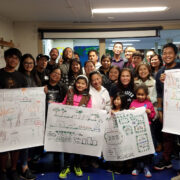
By Ruby N. Turalba
Filipino Americans are disproportionately impacted by chronic diseases such as hypertension, cardiovascular diseases including heart attack and stroke, type 2 diabetes, and overweight/obesity. The National Center for Health Statistics reports that Filipino Americans have the highest rate (23%) of experiencing multiple chronic health issues compared to all other Asian ethnic groups.
In addition, Filipino Americans are one of the fastest-growing Asian groups in the U.S., topping 4 million in 2019. Despite these alarming trends, our growing population, and the recent awareness that underlying health conditions can complicate COVID-19 infections and outcomes, public health research on Filipinos and chronic diseases remains limited.
To address the health of our community, we take action!
Kalusugan ng Bayan/Our Health, Our Community is a three-year initiative developed by the South of Market Community Action Network (SOMCAN) to improve the well-being of Filipinos in San Francisco. This initiative is of, by, and for the people. Goals of the community-based action research project are: 1) to understand the community’s knowledge, attitudes, behaviors, and risk factors related to chronic diseases; 2) to increase community awareness of chronic disease prevention; and 3) to advocate for policy and environmental strategies that support health. Community health ambassadors play an important role in all stages of this project.
We found that of 300 Filipinos surveyed, almost two-thirds (63%) reported having a family history of chronic diseases, with diabetes and high blood pressure as the most common. A majority of survey respondents were bilingual in Tagalog and English (94%), over three-quarters (77%) were renters, and almost a third (27.9%) were very low-income. Findings from two focus groups revealed that chronic diseases are prevalent and serious in the Filipino community; chronic diseases negatively impact one’s quality of life and relationships; and adult caregivers juggle multiple roles and challenges. We also learned that although Filipinos comprehend individual risk factors such as diet and exercise, they have less awareness of socio-economic factors including acculturation and neighborhood conditions. Local community centers were reported to be valuable sources of support for social and physical activities, health information, and basic needs.
We also learned that Filipino community members want:
- Free community classes and educational materials that are culturally and linguistically relevant spanning chronic disease prevention, mental health, and exercise.
- Public resources such as senior centers and community-based organizations scaled up and expanded in SF neighborhoods where large numbers of Filipinos reside.
- Support for caregivers, mental health services, equitable language access, and improved access to Medi-Cal/Medicare.
Community members recommend that City and County Agencies:
- Increase availability of healthy and traditional Filipino foods.
- Maintain and expand parks and open spaces to promote exercise and recreation.
- Address issues of safety, affordable housing, and homelessness.
- Support partnerships with Filipino-serving organizations to provide culturally and linguistically relevant health promotion and education.
To increase community awareness of chronic disease prevention, SOMCAN also collaborated with Kultivate Labs and the Mabuhay Health Center to offer free culturally relevant cooking demonstrations and health education webinars in English and Filipino.
From January to July 2021, 10 cooking demos and webinars served 200+ community members. Food demos were facilitated by Filipino chefs from The Lumpia Company, Jeepney Guy, Mestiza, Little Skillet, and The Sarap Shop to transform traditional and classic Filipino recipes with a healthier, more nutritious twist.
The health education webinars focused on chronic disease prevention, information on COVID-19 and vaccines, and mental health while weekly U-Jam dance classes, taught by dance instructor Krystle Mae Benitez, have kept the community moving and active. The U-Jam dance classes started out at the Bayanihan Community Center and later live streamed because of the pandemic.
Moving forward, the community health ambassadors will create educational handouts and videos about chronic diseases and prevention.
While collecting data and providing education are key initiatives to improving health, policy has the greatest potential to impact the most lives over time. The final phase of Kalusugan ng Bayan/Our Health, Our Community will be to identify and advocate for environmental and policy strategies to reduce chronic health diseases and improve health for Filipinos in San Francisco.
But SOMCAN and their Community Health Ambassadors can’t do it alone. Passing environmental and health policies will require the strength, advocacy, and organizing of our Filipino community. Together, we can beat preventable illnesses like high blood pressure, heart disease, diabetes, and overweight/obesity. Join SOMCAN in their campaign for a healthier San Francisco!
To get a copy of the full assessment report, receive updates or get involved, please contact SOMCAN’s Health & Wellness coordinator Alyssa Daulat at: adaulat@somcan.org or (415) 255-7693.
* * *
The opinions, beliefs and viewpoints expressed by the author do not necessarily reflect the opinions, beliefs and viewpoints of the Asian Journal, its management, editorial board and staff.
* * *
Ruby N. Turalba is a child of immigrants from La Union, Philippines. She teaches public health at San Francisco State University and is a research consultant for SOMCAN’s Kalusugan ng Bayan/Our Health, Our Community program.







